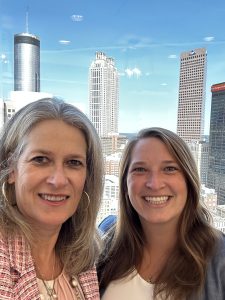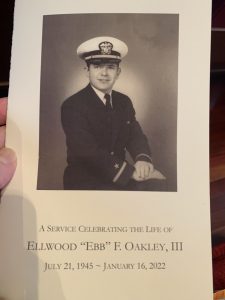Articles Tagged with Professionalism
Georgia Supreme Court Rebukes Georgia Attorney General’s Office for Lack of Integrity, Honesty and Professionalism

In what can only be described as a jaw-dropping, scorching opinion, issued on December 20, 2023, the Georgia Supreme Court soundly rebuked the Georgia Attorney General’s Office for lack of integrity in negotiations with the Federal Defender Program regarding when the AG’s office would resume executions of death-sentenced inmates.
Know the Truth About Personal Injury Lawyers Before Hiring One: You Need An Actual Georgia Trial Lawyer
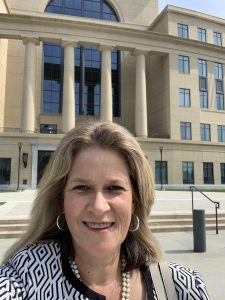
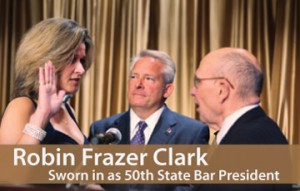
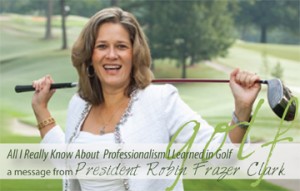
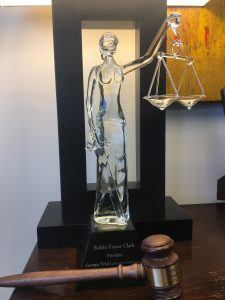
Lately, I am seeing more and more advertisements, on T.V., on Youtube, on Court TV, on Instagram, on Tik Tok, essentially on every Internet Platform you can think of, of lawyers who tout their legal acumen and ability to get an injured person a lot of money with very little effort. Some of these advertisements have fake clients in them who look perfectly normal, healthy and uninjured, claiming their attorney got them a check for $350,000.00 or some high dollar amount “just like that” with “one call.” Some of these advertisements brag about their lawyers being “trial lawyers” when they actually haven’t even tried very many cases, if any. Some of these advertising lawyers claim to be “elite” (they actually use that word) and yet haven’t even tried 10 cases. Some of these advertisements actually mislead the injured consumer with false statements about what the law and ethical rules allow. Some of these advertisements brag that their lawyers have secured more money in verdicts than any other firm in the “universe” or the “metaverse,” and yet aren’t even licensed to practice law in the State of Georgia. Some of these advertising lawyers brag about obtaining a verdict but upon closer inspection, it was a bench trial, decided by a judge, with no opposition. Things that make you go hmmm…. As a Georgia trial lawyer with over 34 years of experience, I am really just plain sick of it.
I want to help the person who has been injured as a result of someone else’s or some entity’s negligence who is looking for a bona fide Georgia Trial Lawyer to represent them with their case, all the way through trial and appeal if necessary. These are things you should know when hiring a trial lawyer.
- Is the attorney actually licensed to practice law in the State of Georgia? Any member of the public can find this out very easily, thanks to the State Bar of Georgia. Simply go to the State Bar’s website, gabar.org, and on the right side you will see a “Member Directory” where you can search for the person’s name. It will tell you if that person is a member of the State Bar of Georgia, where the person went to law school, and when the person first started practicing law in Georgia. This member search on gabar.org will also tell you whether the lawyer has been subject to any public discipline. This tells the consumer how much experience the lawyer has with the law of Georgia. Do you really want to entrust your case to someone who has been a lawyer for only two years? If you are looking at a law firm’s website, you should search every member of the firm here. If only one out of the entire firm is actually licensed to practice law in Georgia, that should tell you how little experience that one Georgia lawyer, in all likelihood, actually has in Georgia law and especially Georgia trial law. Stay away.
Farewell to My Friend, Georgia Lawyer Ebb Oakley
Georgia Supreme Courts Celebrates 175 Years

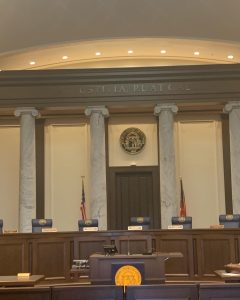

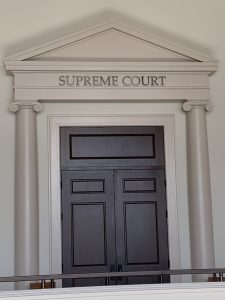
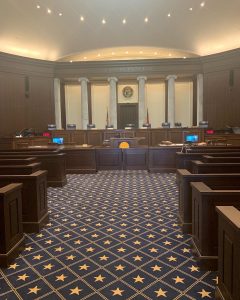


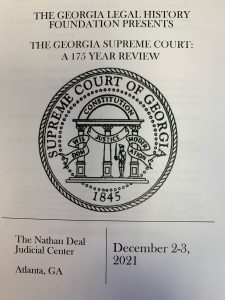
Oyez, Oyez! Oyez! All persons having business before the Honorable, the Supreme Court of Georgia, are admonished to draw near and give their attention, for the Court is now sitting. God Bless the State of Georgia and this Honorable Court. May it please the Court.
Yesterday, I was honored to speak in the Georgia Supreme Court as part of the Court’s 175th Anniversary Celebration. The Celebration began Wednesday evening with a lovely dinner at The Commerce Club. Thursday was a full day of seminar on the history of the Supreme Court and biographies of various former Justices. I spoke about the creation of the State Bar of Georgia in 1964, which was approved by the Georgia Supreme Court and five years later held to be Constitutional in two separate cases. It was one of the highest honors of my career. I am sharing with you below my presentation.
We are very fortunate to have the Georgia Supreme Court and the State Bar of Georgia, which, together, protect your rights to live in a Just society, grounded in the Rule of Law, so that all may reap the benefits and rewards that our system of Justice provides.
Remembering a Great Jurist and a Dear Man: Justice George Carley

We received some sad news this Thanksgiving weekend about a dear friend. Justice George Carley had died.
Many tributes are now coming in about Justice Carley. One, from Judge William Ray, (U.S.D.C.,Northern District of Georgia) touched me and let me know we had similar relationships with Justice Carley. The Georgia Supreme Court, from which he retired, also paid tribute to him and I urge you to watch it. These tributes reminded me of my relationship with Justice Carley that I now share with you in memory of him.
Justice Carley was a proud “Double Dawg,” meaning he graduated from both undergraduate school and law school at The University of Georgia, often referred to as just “The University,” as if there were no others. He is the only person to have served as both Presiding Judge and Chief Judge of the Georgia Court of Appeals, and the Presiding Judge and Chief Judge of the Supreme Court of Georgia.
What Are You Doing for Someone Else Today? Saying Farewell to Georgia Legal Giant Justice Robert Benham
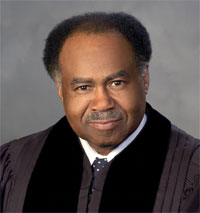
Today marked the last day on the job for Justice Robert Benham. That “job” being no less than serving on the state’s highest court, the Supreme Court of Georgia. A true pioneer, he was the second African-American graduate of UGA law school and the first to serve on the Georgia Supreme Court. He is retiring after 36 years on the appellate Courts (5 on Georgia Court of Appeals and 31 on Supreme Court). Appointed by Gov. Joe Frank Harris in December 1989, he was the first African-American ever appointed to the Supreme Court in its more than 140 years. He served in the United States Army Reserve attaining the rank of captain, and served as a trial attorney with Atlanta Legal Aid among many other professional accomplishments. A lifelong resident of Georgia, Justice Benham was born to Jesse Knox Benham and Clarence Benham in Cartersville, Georgia. He obtained a B.S. in Political Science from Tuskegee University in 1967 and also attended Harvard University. In 1970 he obtained his Juris Doctor from the University of Georgia, Lumpkin School of Law. He obtained Master of Laws degree from the University of Virginia in 1989.
As a tribute to Justice Benham, I am sharing my remarks from the 2013 Justice Robert Benham Community Service Awards. Prompted by concerns about the decreasing number of lawyers in leadership positions in public and community service, then Chief Justice Robert Benham in 1996 created a Community Service Task Force under the auspices of the Commission on Professionalism. Composed of leaders of the bench and bar in Georgia, the Task Force determined to encourage, support, and recognize within the profession the tradition that all lawyers perform community service and measure their success in ways other than just financial gain. To accomplish its purpose, the Task Force created the Justice Robert Benham Annual Awards for Community Service in partnership with the State Bar to honor lawyers and judges from the ten judicial districts of Georgia who have made outstanding contributions in the area of community service. Since 1998, the Commission has coordinated the selection and presentation of these Awards.
Justice Benham, to say you will be missed on the bench is an understatement. I will always think of you with great love and admiration. You are the ultimate role model for any lawyer. The hallmarks of your career and life are integrity, kindness, compassion for others and wisdom. You deserve only the best in your retirement. Godspeed!
5 Things POTUS Could Learn From Lawyers
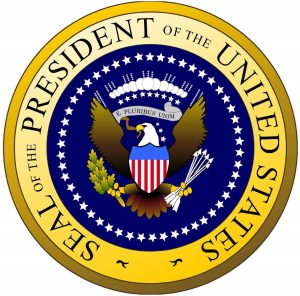
We are about to reach the 100 day milestone of the current POTUS, and with that come many criticisms and many “attaboys.” It’s all in the eye of the beholder. This POTUS is the first in a string NOT to be a lawyer. When you think about that, the fact that he is not a lawyer, nor has he ever served in any public service role, means he has had no formal training in the Constitution nor in either drafting, interpreting or applying legislation. These are things that lawyers do every day, day in and day out. That is pretty obvious. What may not be at the forefront of your mind when thinking about lawyers is the professionalism displayed by lawyers every day. Not only must lawyers as professionals in the practice of law abide by certain formal ethical rules and rules of professionalism, they must also insure they practice with a certain courtesy and respect for their opponents and for the judicial system that other people, say, real estate tycoons, for example, do not. So as we approach that 100 day marker for the POTUS, I have been thinking of a few things that POTUS, a non-lawyer, so far has failed to demonstrate consistently in the last 100 days and what he could learn from lawyers…things I think would naturally serve him, his administration and most importantly, the people of the United States, well.
- Be Impeccable With Your Word. A lawyer’s ability to advocate successfully for his or her client is only as good as his or her credibility, and credibility directly flows from being able to count on what a lawyer says as being true. No half-truths, no hedging the truth, no embellishment to make your facts seem just a little bit better than they really are. A lawyer must always tell the truth in all dealings or risk complete ineffectiveness, or worse, a client’s, or an opposing counsel’s, or a judge’s (gasp!) not being able to believe what the lawyer is telling them. Once that happens, all is lost. You may have heard this referred to as “your word is your bond.” The Cambridge Dictionary defines this as “If someone’s word is their bond, they always keep a promise.” Nothing is truer for a lawyer. Lawyers even have a duty of candor to the court to inform the court of case law or precedent that goes against their client’s position in court. Can you imagine a salesperson having to tell a customer that he could actually sell a car to you for less than what you, the customer, is willing to pay for it? Of course not, but lawyers are required to act with that much candor and honestly at all times before the Court. The ideals of professionalism in the practice of law are aimed at ensuring our profession remains a “high calling” and not “just a business like any other,” enlisted in the service not only of the clients, but of the public good as well. “A Lawyer’s Creed,” developed by the Chief Justice’s Commission on Professionalism (the Commission), states it as thus: “To the courts, and other tribunals, and to those who assist them, I offer respect, candor, and courtesy. I will strive to do honor to the search for justice. ”
- Never Take Anything Personally. I think this is good advice for everyone, but especially lawyers must behave like this and are expected to do so. Trial lawyers must always do their jobs in an adversarial situation. By definition, there will also be another lawyer representing the opposing party in a lawsuit trying his or her level best to prevent you from succeeding. Think how hard this is! If we were talking about the profession of medicine and using surgery as our analogy, no other surgeon comes into an operating room to try to prevent the operating surgeon from performing the surgery successfully! No other doctor comes in and tries to kill your patient! But that is precisely what occurs in the practice of law. Every time I represent a client there is an opposing counsel trying to prevent me from succeeding. It’s pretty stressful, but would be even worse if the lawyer takes his opposing counsel’s efforts personally. The opposing counsel is just trying to do his job well, too. That’s all. And The Lawyer’s Creed requires lawyers to promise this to opposing counsel: “To my colleagues in the practice of law, I offer concern for your welfare. I will strive to make our association a professional friendship.” We also are required to make this promise: “To the opposing parties and their counsel, I offer fairness, integrity and civility. I will seek reconciliation and, if we fail, I will strive to make our dispute a dignified one.” Temper tantrums and other demonstrations of pettiness and “unsportsmanlike conduct” have no place in the legal profession. Following a trial, adversaries shake hands, regardless of the outcome. I have never had a problem shaking the hand of my able adversary when he or she has conducted himself or herself with integrity and professionalism throughout the litigation. It honors our justice system and your opponent. As Shakespeare wrote in “The Taming of the Shrew,” “do as adversaries do in law, strive mightily but eat and drink as friends.”
My Tribute to Justice Robert Benham, Georgia Supreme Court

Lawyers Club of Atlanta
Newsletter – February 2015
|
|
|
From the President
|
|
Friends: I sat down at the bar at Lawyers Club the other night with my good friend and Past President Hal Daniel, the sole endeavor in mind being to enjoy a cup of cheer together following a long day at the office. After we ordered our “usuals” and eagerly awaited Kenny’s expert renditions, instead of the usual “How are you doing?, Hal asked me the following question: “What have you done today to make someone else’s life better?” Intriguing. What followed was a genuine reflection of my day and Hal’s to see if we could honestly lay claim to such a noble endeavor as making someone’s life better rather than just barely making it through a hard workday unscathed and still standing and breathing. The question brought to mind one of my favorite stories about one of my heroes, Justice Robert Benham. My service as President of the State Bar fortunately provided me many opportunities to spend time with Justice Benham and hear many wonderful stories about his life growing up in Bartow County. Before I share this wonderful story with you, let me give you a little background on the Honorable Robert Benham as a reminder and to set the stage. Justice Benham distinguished himself as the first African American to win statewide election in Georgia since Reconstruction. In 1989, Justice Benham was further distinguished as the first African American to serve on the Supreme Court of Georgia, following his appointment by Governor Harris. He also made history both as the first African-American to establish a law practice in his hometown of Cartersville. In what can only be described as something straight out of a movie, when Justice Benham would walk down the street in Cartersville to go to the Bartow County Courthouse, many fellow African Americans would come out of their homes and out of their places of work to follow him down the street. The shouts of “Attorney Benham’s going to court,” “Mr. Benham’s going to court” could be heard as they followed their hero, then “Attorney Benham”, to the courthouse, because they knew Attorney Benham was going there to stand up for the little guy, the underdog, which they, undoubtedly, felt they also were. Attorney Benham became for many African Americans the embodiment of justice, and although he was walking to court to represent one specific accused person, dozens of other citizens felt he was also representing them. Justice Benham’s first lesson of service to others probably came at the hands of his mother, who insisted that he shine shoes at the local barber shop. His mother had this view that if you ever plan to lead people that you must be willing to serve them first and there’s no more humbling experience than being down on your knees shining somebody’s shoes. As she said, “If you do that you won’t be full of yourself.” So Justice Benham as a little boy, with his brothers, shined shoes at Bob Cagle’s barber shop. As I have heard Justice Benham say, “the American Dream is that a black child from Cartersville who shined shoes in a barber shop can grow up and shine in the Halls of Justice.” Which brings me to the story that Hal’s question to me that night at Lawyers Club brought to mind. In the Kennesaw State University Department of History and Philosophy Summer Hill Oral History Project, Justice Benham described his family’s origins for insistence on service to others. “Family meals were not optional, they were required. A blessing was said at every meal and the children, my two brothers and I, were required to say a Bible verse. We could not say the same Bible verse anybody at the table said and we could not use the same Bible verse during that week, and that was required. There was no television on, and we were the only family in the neighborhood who had a television, but you did not watch TV while you were at the family meal and you engaged in discussion. Daddy would always ask, “Well, what are you going to do today?” And then we knew what was coming next, “What are you going to do today for somebody else?” That was at every breakfast.” “What are you going to do today for somebody else?” Quite a lesson that Justice Benham never forgot. Years later, Dr. Martin Luther King, Jr. would say that life’s most persistent question is “What are you doing for others.” Life’s most persistent question has been the hallmark of Justice Benham’s life.
One of the hallmarks of the profession of law is a recognition that along with the privilege to practice law comes a duty to subordinate financial reward to social responsibility. We will celebrate many of our fellow lawyers who have done just that by offering themselves to public service through service on the bench at our cocktail meeting this month on Wednesday, February 18. Please come and thank our honored judiciary for their service. You won’t want to miss it. Hal’s question was a good one to ponder and so I ask it of you, my fellow Lawyers Club of Atlanta members: What have you done today to make someone else’s life better?’ Let’s have a drink together soon at the club to discuss. Cheers, Robin Frazer Clark Robin Frazer Clark President 2014-15 |
Judge Ed Carriere: The Embodiment of Professionalism
The last two Fridays I have spent speaking at Continuing Legal Education Seminars sponsored by the Institute of Continuing Education. My topic: Ethics and Professionalism. In preparing for both presentations, I couldn’t help but think about a dear departed friend who was the embodiment of Ethics and Professionalism, Judge Ed Carriere. I recall as one of the highest honors of my year serving as President of the State Bar of Georgia the day I accompanied Chief Justice Carol Hunstein to Judge Carriere’s home and with his wife, Jane, present, Chief Justice Hunstein published the resolution below. It gave me goose bumps then and it does now in the remembering of it. I wish everyone could have known Judge Carriere. Certainly, everyone who did was changed for the better. I share with you the Joint Resolution honoring Judge Carriere. 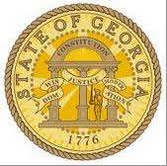 The Supreme Court of Georgia
The Supreme Court of Georgia
Whereas: The Honorable Edward E. Carriere, Jr. has rendered more than four decades of service to the justice system and the legal profession in the State of Georgia; and
Whereas: Judge Carriere earned his law degree at Loyola University in California and was admitted to the State Bar of Georgia in 1971; and
 Atlanta Injury Lawyer Blog
Atlanta Injury Lawyer Blog


